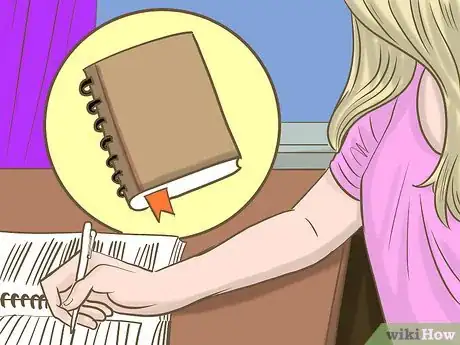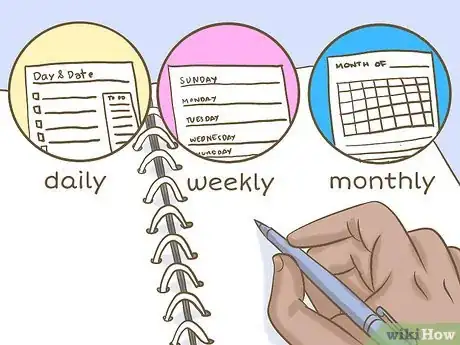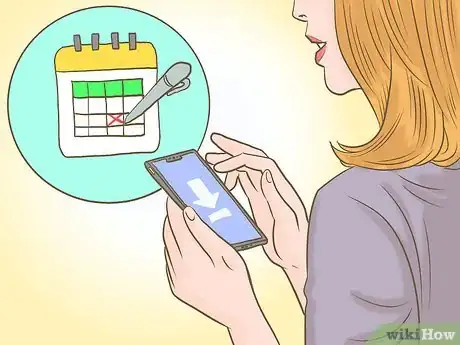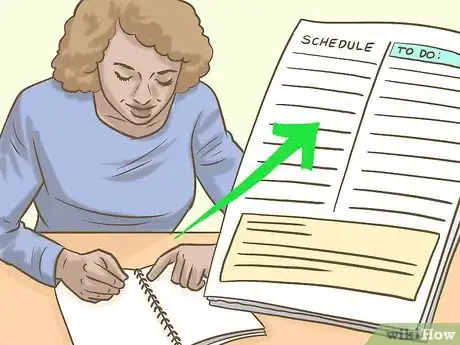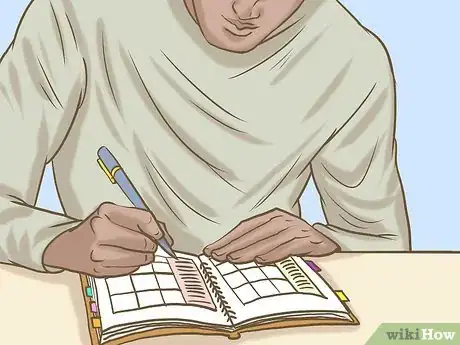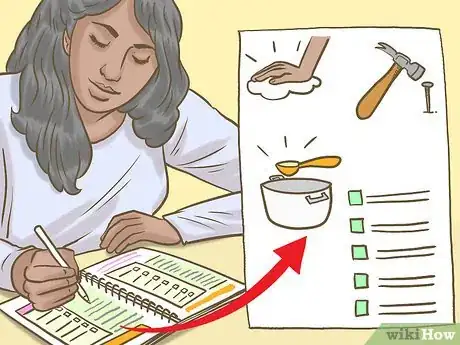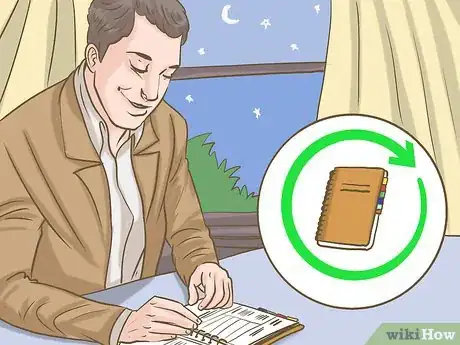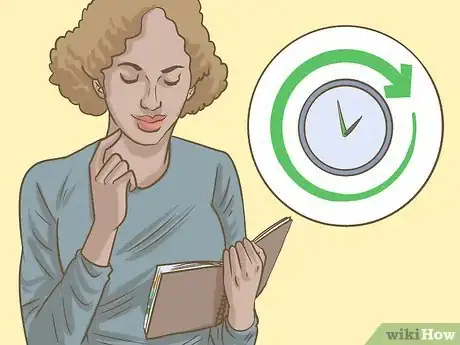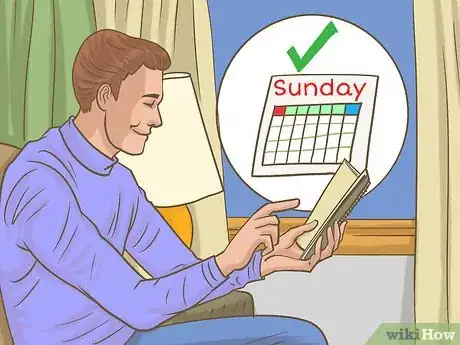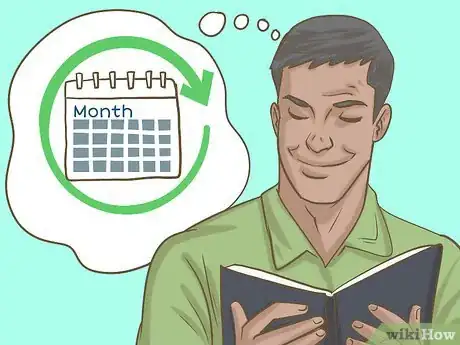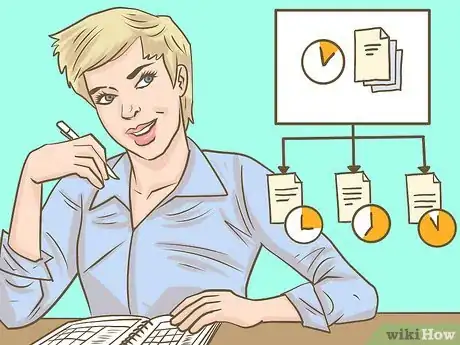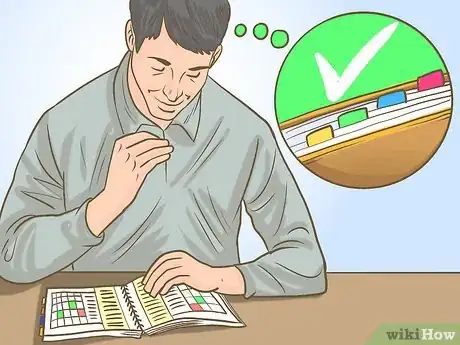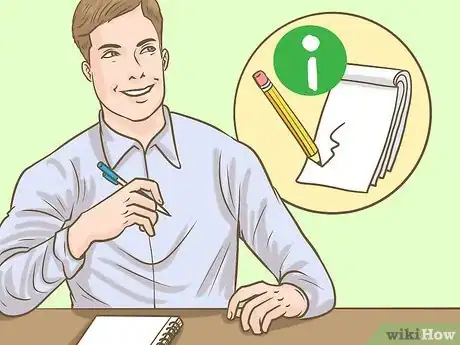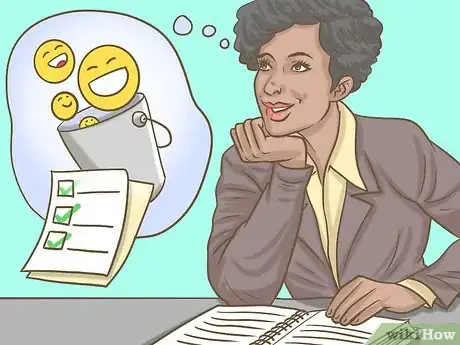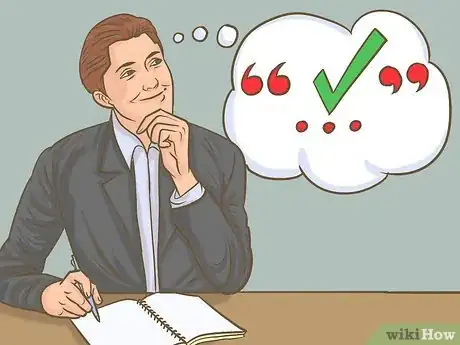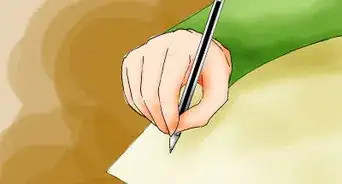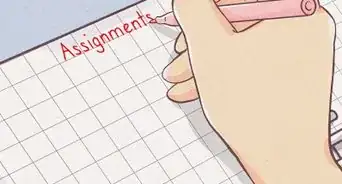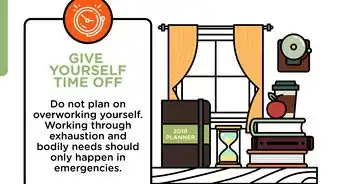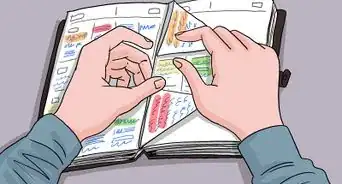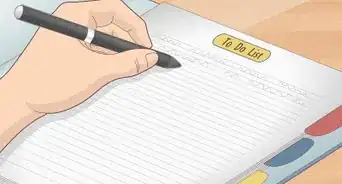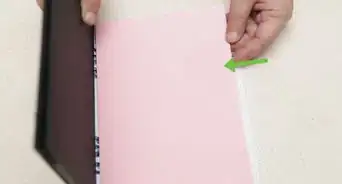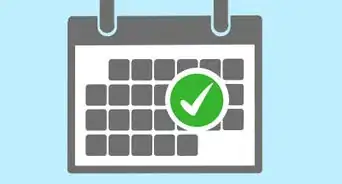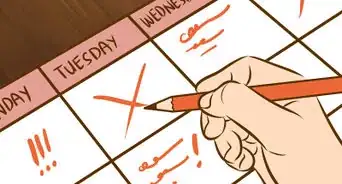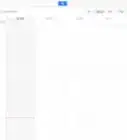This article was co-authored by Adina Zinn, MPA. Adina Zinn is a Certified Career & Life Coach and the Owner of Love Your Work Career and Life Coaching. With five years of experience, she specializes in using a holistic coaching approach to help people achieve their career and life goals. Adina earned a BA from The University of California, Santa Cruz and an MPA from San Francisco State University. She is also a Certified Career Coach through Career Coaches Institute and a Certified Life Coach through The International Coaching Federation.
There are 11 references cited in this article, which can be found at the bottom of the page.
This article has been viewed 20,452 times.
Planners are a great way to keep your life and appointments on track. If you've never used one before, it may seem a little daunting to keep track of all those details. However, once you get the hang of it, a planner is a tool you can employ to use your time more efficiently. Pick a planner that works for your lifestyle, then get busy writing in appointments and to-do lists. Remember to check in with your planner often and find ways to make your planner your own so that it meets your needs.
Steps
Picking a Planner
-
1Use a paper planner to help you remember appointments. Writing things out by hand makes you actually think about what you're writing. When you are forced to think about it, you're more likely to remember the things you need to do, even without looking at your planner.[1]
- Plus, using a paper planner keeps you from bouncing around from app to app; you can have a to-do list, long-term planner, and an appointment calendar all in one place.
-
2Decide on a type of paper planner. Paper planners come in a variety of options. You can get daily, weekly, and monthly planners, for instance. The daily planner will have a lot more space for writing down appointments and to-do lists. However, a monthly planner will help you see the big picture. Some planners are a combination of monthly and daily planners, so you get the best of both worlds.
- Browse the planner section to see what speaks to you and your lifestyle!
Advertisement -
3Pick an app version for convenience. If you always have your phone on you, then an app version may make more sense for your lifestyle. Try to pick a planner app that lets you do multiple things, like schedule appointments and set monthly goals.
- The bonus of using an app is you can set reminders to ding you throughout the day.
-
4Decide if you need more than one planner. One option is to have a single planner to carry with you everywhere, which makes it easier to check it all the time. However, it can also get cumbersome to carry a large planner around. If that's the case, you may want to get more than one planner. Try a large planner for your desk, for instance, and then have a smaller one to carry around.
- However, make sure that you don't write things just on your desk planner that you need on your smaller planner.
-
5Choose one that has room for a schedule and a to-do list. The schedule part of the planner is essential. That's where you write your appointments. However, it's also good to have space each day for things you need to get done, even if you don't have a scheduled time for them. Pick a planner that has enough space for writing down everything you need to do.[2]
- It's also a good idea to pick one that has room for long-term goals and notes, too.
Scheduling Your Life
-
1Write down every appointment and deadline you can. Don't just write in appointments and meetings. Write down when you need to go to the grocery store and when you have a lunch date planned with a friend. Include work assignment deadlines and any regular things you attend, like hobby classes or church meetings.[3]
- The more you plan out your time, the more efficient you'll be.
-
2Add chores to your planner, too. A planner isn't just a schedule for meetings and appointments. It also acts as a to-do list. Write in times when you can do things like clean the kitchen, work on repair projects around your house, or meal prep for the week.[4]
- Try to schedule your most demanding tasks during parts of the day where you naturally feel more productive.[5]
-
3Schedule breaks for yourself, too. Life can get so busy that you forget you need to take care of yourself, too.[6] If you find yourself overstressed most of the time, work in a little time on your calendar each week or even every day to do something you enjoy.[7]
- For instance, you could schedule time for having a quiet evening at home with a bath and a good book.
- Add time each evening for winding down before bed so that you get an adequate amount of sleep.
- It's important to be realistic about what you can accomplish in a day.[8]
-
4Include financial reminders to maintain your budget. Make sure to include when bills are due so you don't forget to pay them. In addition, use your planner to keep track of your budget, as well as any goals related to your budget.[9]
- For instance, you could keep a running tally of what you spend each day so you stay under budget.
- You could also write in reminders to save money or to budget for your vacation coming up.
Checking in with Your Planner
-
1Review your planner each night for the next day. A planner only works if you use it regularly. Each night, look at what you have ahead for the next day so you can mentally prepare yourself for what's ahead.[10] [11]
- Plus, reviewing your planner helps keep your mind from racing while you're trying to go to sleep. You already know and have a record of what you're going to do tomorrow, so you don't need to think about it as much.
-
2Check your planner throughout the day. Even if you review your planner the night before, you still need to look at it frequently throughout the day. Doing so will help keep you on track with where you are.[12]
- For instance, you may forget that you had planned to go to the grocery store after work; glancing at your planner will remind you.
-
3Look at your upcoming week each Sunday night. Review what's ahead for the week, and make sure everything is on your schedule that needs to be. Go through the week in your mind so you can see what needs to be done each day.[13]
- If your week doesn't start on Monday, pick the day before it starts for you.
-
4Look at the big picture at least once a month. It's easy to get bogged down in the day-to-day details. To be more successful, though, you can challenge yourself to accomplish larger goals. Take time each month to think about what larger things you'd like to do for yourself. That way, you can schedule smaller tasks to start working towards those goals.[14]
- For instance, maybe you'd like to learn how to paint. Write that down in the monthly section. Then, add time to your weekly schedule to research classes and register for one you can take.
- If you forget to take time to look at the bigger picture, add it to your planner once a month!
Using Tricks to Make Your Planner Work for You
-
1Break large projects into smaller tasks with individual deadlines. If you're one of those people who procrastinates to the last minute on big projects, use your planner to help you overcome that personality quirk. When you break a project into smaller tasks, it becomes more manageable, and you won't be waiting to the last minute to finish it.[15]
- For instance, maybe you want to clean the whole house before your relatives show up for a certain holiday. For 1 week, make your goal decluttering the house, and set a different room to do each day. For the next week, aim to put clean sheets on the guest bed and air out the room. Breaking the project into smaller tasks makes it easier for your brain to complete each small step.
-
2Use colorful tabs to color-code your planner. Pick one color for appointments, one for meetings, one for work deadlines, and so on. Then put a tab by each type of appointment so you have an easy visual reminder.[16]
-
3Include details when you write down appointments. Instead of just writing down a person's name or a location, write a full sentence about what you're doing. That way, you'll be able to jog your memory about what's happening.[17]
- For example, instead of writing, "Greg 12:00 p.m." or "Church 6 p.m.," write "Have lunch with Greg at La Luna, 12:00 p.m." or "Attend church meeting on finance at 6 p.m."
-
4Create an easy-to-remember shorthand. Because planners don't always have as much space as you'd like, you may need to make your notes shorter. Shorthand can jog your memory about what you're doing without taking up too much space.[18]
- For instance, you might use "Appt." for "appointment" or "MT" for "meeting." Just be consistent, and make a key for your shorthand so you don't forget.
-
5Add a monthly bucket list. Make a list of things that would be fun to do or try in the next month. If you write it down, you're more likely to do things on your list, as you've committed them to paper or an app.[19]
- For instance, you might write things like "Take a walk around the lake," "Have a weeknight picnic with the family," "Read a new book," or "See a movie."
-
6Write in a focus word or inspirational quotes. A planner is a great tool for keeping yourself inspired. Try picking a focus word for each month to keep you on track, for instance, or include quotes you like. You can even glue in small pictures that inspire you.[20]
- For instance, maybe your focus word for the month could be "joy."
- Look for quotes and pictures online or try cutting them out of magazines.
Daily Planner Entry Template
References
- ↑ https://www.nytimes.com/2018/01/04/smarter-living/paper-planner-guide.html
- ↑ https://www.entrepreneur.com/article/306875
- ↑ https://www.additudemag.com/organize-prioritize-adhd-child-school-homework-help/
- ↑ https://www.psychologytoday.com/us/blog/living-the-questions/201808/6-reasons-why-you-should-use-daily-planner
- ↑ Adina Zinn, MPA. Certified Career & Life Coach. Expert Interview. 30 March 2022.
- ↑ Adina Zinn, MPA. Certified Career & Life Coach. Expert Interview. 30 March 2022.
- ↑ https://www.psychologytoday.com/us/blog/living-the-questions/201808/6-reasons-why-you-should-use-daily-planner
- ↑ Adina Zinn, MPA. Certified Career & Life Coach. Expert Interview. 30 March 2022.
- ↑ https://www.entrepreneur.com/article/306875
- ↑ https://www.treehugger.com/cleaning-organizing/8-steps-using-paper-planner-effectively.html
- ↑ Adina Zinn, MPA. Certified Career & Life Coach. Expert Interview. 30 March 2022.
- ↑ https://www.treehugger.com/cleaning-organizing/8-steps-using-paper-planner-effectively.html
- ↑ https://www.entrepreneur.com/article/306875
- ↑ https://www.entrepreneur.com/article/306875
- ↑ https://www.additudemag.com/organize-prioritize-adhd-child-school-homework-help/
- ↑ https://www.additudemag.com/organize-prioritize-adhd-child-school-homework-help/
- ↑ https://www.treehugger.com/cleaning-organizing/8-steps-using-paper-planner-effectively.html
- ↑ https://www.additudemag.com/high-school-planner-motivate-adhd-teen/
- ↑ https://www.entrepreneur.com/article/306875
- ↑ https://www.entrepreneur.com/article/306875
